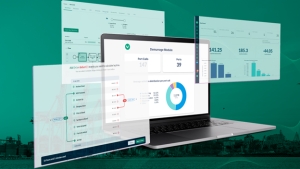


(Posted on 14/08/23)
Voyager, the operations and demurrage management platform for bulk commodity shipping, is urging shipping companies to take a proactive stance and adopt a number of Best Practices in order to reduce the costs and risks of demurrage.
A dramatic surge in port congestion and associated supply chain disruptions have led to longer waiting times and higher demurrage costs, said Voyager co-founder and CEO Matthew Costello. “This issue is particularly severe in the bulk shipping sector, where demurrage costs can exceed 20% of the total freight cost for a voyage,” he said.
“However, demurrage doesn’t have to be a substantial burden on a company’s resources. By implementing three key Best Practices, companies can significantly reduce the cost of demurrage and streamline their operations.”
Voyager says companies should estimate and analyse demurrage in real-time, automate their Statement of Fact (SoF) data processing and logically analyse their charter parties.
“These changes will give your company the necessary tools to stay ahead, making informed, data-driven decisions that result in savings and greater efficiency,” said Costello.
According to Voyager, many businesses make the mistake of calculating laytime and estimating demurrage claims only after they receive a claim from the shipowner – leaving no room for adjustment. Instead, companies should take a proactive stance; by estimating and analysing demurrage immediately after the first load port, they can gain a real-time assessment of their demurrage risk at every stage.
By taking into account historical factors such as waiting times, congestion and lineups, operators can gain a realistic estimate of the demurrage risk for the entire voyage; these costs can be allocated to profit-and loss-statements accurately and any claim can be anticipated in advance. This also offers dynamic opportunities for risk mitigation by coordinating with terminals and other vessels to expedite discharge and avoid unnecessary delays.
Secondly, Voyager recommends that companies digitise all their SoF events data, to provide granular insight throughout the loading and discharging process – invaluable in assessing the efficiency of the terminal, the berth and the discharge itself. By automating the processing of this data, companies can streamline their demurrage calculations and gain real-time insights, informing decisions related to seasonality, congestion and efficiency.
Finally, Voyage urges companies to connect charter party agreements to demurrage logic. This involves more than just transferring data fields into a database – logic should be assigned contracts and fields, so that it can be understood how specific clauses in a contract are impacting demurrage claims. For example, there may be particular clauses that incur more cost at a certain berth or port. Analysis of the charter party enables dynamic optimisation of contracts across the company, which can highlight areas of potential savings based on data-driven decisions.
Voyager Portal views demurrage as an opportunity for businesses to alleviate the impact of port congestion, improve tighten up contract weaknesses and drive overall business improvement, said Voyager co-founder and COO Bret Smart. “Demurrage costs due to inefficiencies eventually get passed on to the customers, creating a situation where no one wins. Proactive management and intelligent data utilisation are the keys to unlocking significant business improvement,” he said.
“Ultimately, automating document processing and laytime calculations can free up valuable time for demurrage teams, with up to 50% of time savings. The time freed up can be used by analysts to go back to contracts and review clauses to identify other savings opportunities.”
Torvald Klaveness has announced the decision to consolidate all digital services under Klaveness Digital... Read more
The International Association of Dry Cargo Shipowners (INTERCARGO) has renewed its call for straightforward... Read more
The Swedish Club has delivered strong results for 2024, posting a USD 34 million profit and significantly... Read more
In line with NORDEN’s positive long-term outlook for Capesize freight rates, the company have... Read more
OrbitMI, a global provider of maritime software and data products, has expanded its workflow capabilities... Read more
Current ClassNK Senior Vice President Hayato Suga has been appointed as President & CEO as well... Read more
The surge in demand for Cape Size bulk carriers will continue for another six weeks, driven on by increased... Read more
OrbitMI, a leading provider of maritime SaaS software, has announced that Istanbul-based Statu Shipping... Read more
“The International Association of Dry Cargo Shipowners (INTERCARGO) is deeply saddened by the... Read more
As the shipping industry continues its transition to carbon-neutral fuels, ammonia and hydrogen are... Read more